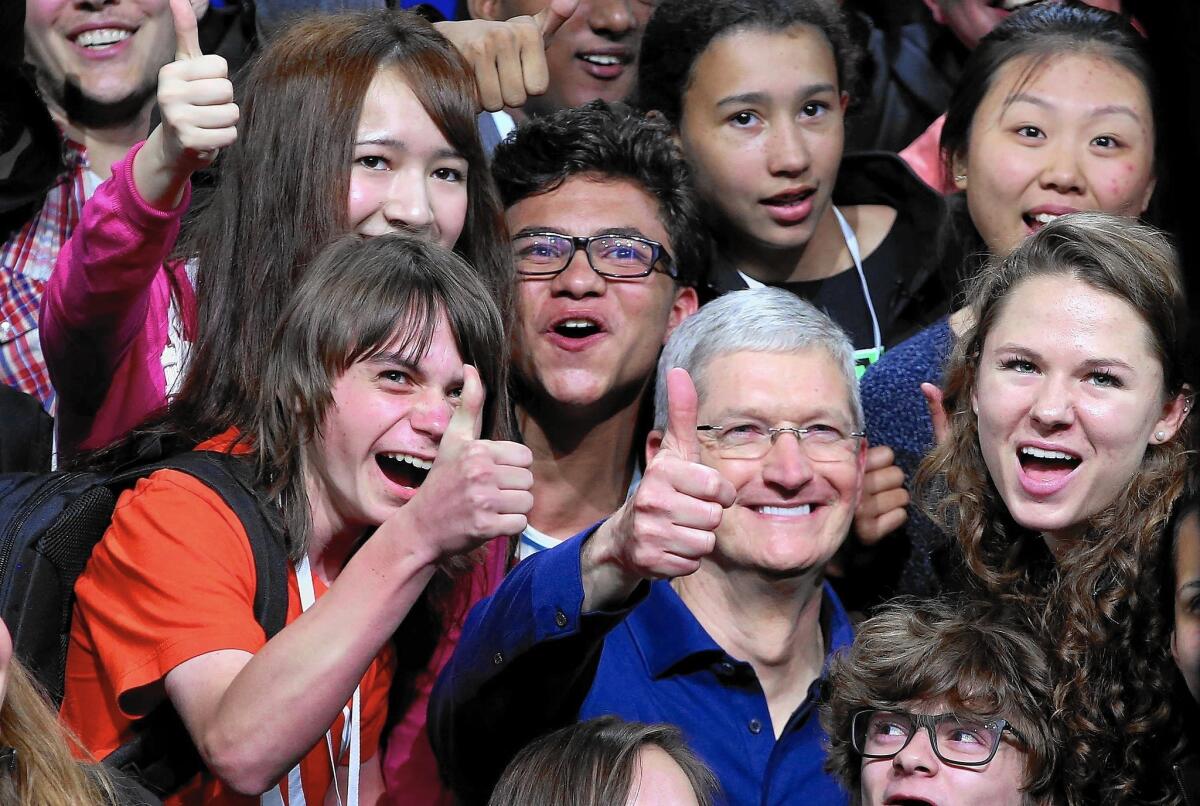Five things we’d like Apple Music to clarify

- Share via
Daniel Ek of Spotify, the Beggars Group label consortium and the almighty Taylor Swift (among many others) are among the many who have all inveighed, quipped or protested against Apple Music, which stands to profoundly reshape the music industry with its launch Tuesday morning.
Offering a centralized location for streaming music, integration with Apple’s universe of hardware products and at least a nominal nod to real live humans overseeing its ecosystem, there’s a lot of potential here. But that doesn’t mean there aren’t plenty of reasons to be skeptical. Here are five things for Apple to keep an eye on as it rolls out.
Will anyone care about the radio stations?
Beats One, the flagship broadcasting arm of Apple Music, is the most overtly human part of its service. Zane Lowe was hired from BBC Radio 1 to join DJs and presenters Ebro Darden and Julie Adenuga as the faces of the service, and a range of artists — Drake, Pharrell, St. Vincent, Elton John and the young Jaden Smith — will have regular programming blocks.
But is the hunger for curation really there? Music has become so ubiquitous yet so ephemeral in our lives that the idea of a radio station’s stricture seems outdated. We’ll be tuning in to Elton’s quirky “Rocket Hour,” but frankly we’ll be a bit surprised if many of these stations have long-term appeal.
Will fans leave Spotify?
Apple is late to the streaming market, but the company sold more than 60 million iPhones in the first quarter of 2015, and every one of them will have surely access to Apple Music going forward. But inertia is a powerful thing, and at this point there’s no reason for any fan to keep multiple streaming services (except maybe SoundCloud for its vast archive of underground material). For most fans, Spotify already provides ample access to music and benefits from years of built-up playlists. Apple can make people spend $700 on a phone without blinking, but can it get a critical mass to pay another $10 a month?
Will artists revolt?
With just one recent op-ed, Taylor Swift reset the whole argument about Apple’s planned free three-month subscription (or, as artists see it, a quarter of a year without royalty payments). Apple backtracked from that in the end, but it might be just as important to see if smaller labels and acts still feel this is a worthwhile development for them. Apple has quietly been a champion of indie-minded acts in the past, and the artist-centric social-media component is intriguing (even if it’s hard to see fans clamoring for yet another social network). Apple Music is banking on Trent Reznor and Jimmy Iovine’s music-first reputation, and if forward-thinking artists grumble about Apple’s business practices or the quality of the experience, that could lose its luster quickly.
Will the interface be appealing?
For all its dominance in the Apple universe, there might not be a more loathed piece of music software than iTunes. It’s a mess for keeping track of any vast library, and music fans reserve a special place in hell for its frequent updates and botched syncs across devices. Apple Music will have to create an intuitive universe for streaming, because if steering fans (especially older ones) away from downloads and file ownership and into its streaming model is the real goal, it’ll have to make the transition so natural that fans can’t imagine a world without it. Right now, iTunes is the drunk uncle spoiling the elegant party of Apple’s hardware, and Apple Music — already cumbersome with so many elements — gets just one shot to get this right.
Why music, anyway?
Apple is one of the most lucrative corporate entities ever devised by human minds. Why does it seem to care so much about staying ahead in this sphere, when streaming digital music is already free and easily accessible? It’s a glamorous addition to its hardware, but this is as much about Apple’s reputation for products that are covetable fetish objects. Music, for all its fiscal devaluation over the 2000s, still creates intense emotional attachments, and Apple has been profoundly associated with major advancements in how we hear it. For Apple Music to work, it can’t just be an efficient means of playing Drake singles at parties. It has to be loved.
More to Read
The biggest entertainment stories
Get our big stories about Hollywood, film, television, music, arts, culture and more right in your inbox as soon as they publish.
You may occasionally receive promotional content from the Los Angeles Times.











